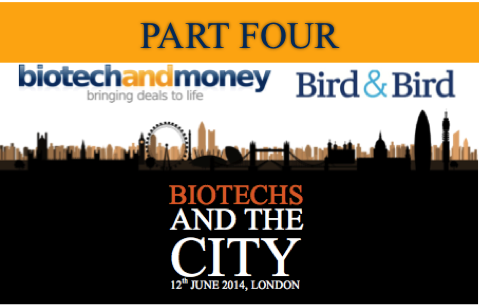Facing up to the biotech IPO and financing challenge - PART FOUR
Biotech and Money, the industry’s newest and most innovative virtual, online and physical private biopharma community officially launched on 12th June with the ‘Biotechs and the City’ Evening Reception at Bird & Bird‘s offices in central London.
The VIP Networking Launch Reception was open to a selection of UK Biotech and Bioscience CEOs, Investors, Industry Analysts, Pharma and Financial Services professionals and was themed around IPO and raising finance in the UK. The evening featured an exclusive hour long panel and Q&A with leading industry and city thought leaders, with ample time for informal networking.
Key panellists at the event were:
- Dr Karl Keegan, Chief Corporate Development Officer, Vectura - Raised £52m through public placement in March 2014
- Dr Paul Cuddon, Equity Analyst, Healthcare and Lifesciences, Peel Hunt - Peel Hunt Ranked 1st Healthcare & Lifesciences (Thomson Reuters 2013 Extel Survey)
- Simon Allport, Partner, Bird & Bird
- Chris Mayo, Consultant, Primary Markets, London Stock Exchange
- Neil Darkes, Co- CEO, Biotech and Money (chair)
- Terence O’Dwyer, Co- CEO, Biotech and Money (chair)
In this fourth blog of the series, we bring you the thoughts and contributions of Dr Karl Keegan of Vectura on experiences from their recent IPO and the wider IPO market.
Neil Darkes [ND]: Karl, it’s well known in the press so congratulations on the recent raising of £52m of finance which is a fantastic amount. How did you prepare for that financing on the placement itself?
Karl Keegan [KK]: Simon mentioned about the IPO preparation and a financial transaction is a financial transaction. You need to do a lot of preparation, the slightly awkward thing with an M&A deal is that sometimes you’re not actually in the driving seat; there’s another party rather than you just preparing for your own exit or entry onto the markets. Also internal preparations are very key, surrounding yourself with good advisers and actually listening to what they have to offer, it actually really helps if you can get along with them as well because transactions are never smooth and there’s always a glitch along the way. Normally when you think you’re leaving at 7pm and you’re still in the same lawyers rooms at 1am in the morning so all of what people have said before, interpersonal skills, prepping for the markets, getting your equity story ready as to why you’re doing the transaction, whether it’s a financial placing or an M&A deal, all very important because as Paul eluded to, there are interesting opportunities but people are not going to throw money at you just because you’re a healthcare or a pharmaceutical company or a biotech company, there’s lots of offerings out there at the moment so you have to take them by the hand and show how you can enhance the investment case by doing a particular transaction. No different from what was said before really.
ND: It’s well versed the differences in access to capital in the US compared to the UK. What are your impressions about US vs UK financing?
KK: What we have seen is there has been for quite a while now this notion that US stocks have a valuation premium and what certainly I’ve noticed in road showing with Vectura is that there are more US funds looking towards Europe to seek out very interesting companies with great technologies that look relatively undervalued compared to some of their US peers. Most of those funds can access UK stocks, through some of their funds but really the key concern for them is not so much technology or access to management it’s the liquidity of the stocks which seems to be the biggest hurdle and if we can address that I think you’ll see more US investors coming in. There’s money from the US there and many of the US funds that you’d elude to a specialist analyst here in London.
ND: In your own personal opinion do you think IPO markets are driven more by push or by pull dynamics?
KK: That’s an interesting one. It depends on a few things and I think there are momentums. If you look back at financing a biotech you will see that there are phases, particularly post-2000 where there were a lot of companies that were changing their story to try and get the best valuation. I do agree with Paul though that if you are a good company and you have a good equity story you can go out but, to use the analogy of Location, Location, Location, you can buy the house but it may not be in the area you want so something has to give - and usually it’s valuation.
The market is very fickle so if you are overvalued it will come back to haunt you at some point. In the UK particularly it helps that we’re going through a broad IPO window as we are in the US. Year to date, although we talk a lot about healthcare only 11% of the financing in the US is going into healthcare, I think it’s tech is the big driver followed by financials surprisingly and then energy so it’s not a huge focus although we tend to focus on it from our position here.
‘The market is very fickle so if you’re an overvalued biotech it will come back to haunt you at some point.’
Part Five and the final blog in the series will feature the questions and comments made by the audience. If you can’t wait for the next blog and would like to see the entire transcript of the panel click here to access it.

Don’t forget to subscribe to get our weekly newsletter, with exclusive advance access to articles, interviews, and executive insight.



Leave a comment